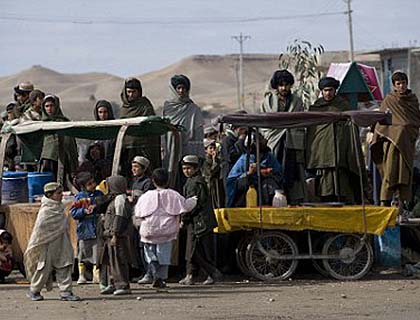One of the key issues that sets Afghans on the roller-coaster of wariness and uncertainty is the transparency and soundness of Presidential election scheduled to be held on April 5, 2014 when foreign allies will have a mere symbolic military presence in the country.
Listening to people and putting glance to daily press releases, it is not hard to understand how much Afghan people are worried about their future. They express deep down concerns over the possibility of fraudulent presidential election and how it may bring about broader political and security consequence.
Two factors win blame for spreading as well as sparking such nation-wide wariness in spite of continuous and generous assurance of officials that the country would not fall once again to its similar
historical chaos and mayhem.
Instead, there the situation is different and widespread wariness about possible re-emergency of war-lordism is reasonless and baseless. Those two factors are: one, the current
corrupt-riddled administrative and political establishment and second, the withdrawal of foreign security forces.
In the first place, Afghan government is rated one of the most corrupt governments in the world. Bribery, nepotism, embezzlement and misuse of power are the most common forms of political and administrative corruption. People who refer to public offices are complaining that without bribing public employees, it is really hard to that they solve your problem. Unfortunately, bribing is not restricted to particular departments or ministries, it has penetrated into the entire establishment even polluted NGOs which otherwise claim having full transparency in all their policies and activities.
Now when a position is posted on websites from NGOs or public offices, people, who are searching for job, first of all, search whether he/she or their friends and relatives know someone in that particular
office in order to shortlist them or not. Whenever, there is no third person, he or she frequently ignores to apply because that would be a mere waste of time. However, some may oppose the notion because for each vacant post tens send the hard or soft copy of their CVs.
Certainly, they are right. But it should be assessed how many of them whose educational and career background meet the requirement of the post will be shortlisted? Even if they be shortlisted finally who
would be the person who gets the job?
I am sure that many just send their CVs with lowest hope, like someone who fires in the darkness, if they did not receive any earlier green signal from someone who is in a position to help him get the job. The
combination of ethnic groups in NGOs are sign of such invisible but existing corruption. NGOs which are headed by a person from particular ethnic group, the ethnic combination of such NGOs also changes.
It
means he prefers to employ those who are from his or her own ethnic group. However, there is no statistics of NGOs' employees on the basis of ethnic groups in references with key figures who are directly involved in recruitment process or who can influence the procedure, but there are evidences which show ethnicity and language play critical role in the employment market.
Few days ago, in the way I met a driver. He was working in a NGO where, he claimed, did not have good salary range. He said that he worked as driver for seven to eight years. Recently, he had interview in World Food Program (WFP) but was rejected because he did not know someone there. He alleged that the entire NGO is dominated by a particular community that also from a particular location. The situation in public offices is far graver. The nepotism has much institutionalized. With the appointment of ministers from a particular ethnic group indeed determines the communal combination of employees.
However, lower administrative positions do not get much notice but respective to importance of the post, bribing and misuse of power become more visible. However, there are various reasons for public corruption but the institutionalized notion of the so-called proportionate recruitment is also to blame.
There is not statistics about the percentage of ethnic groups in the country, but there are contradictory assumptions. Based on the blurred and vogue of notion of communal percentage, public posts are filled on the basis of such assumption. For instance, Hazaras are assumed to constitute lesser than 20 percent of total population but yet they can establish only 11th percent of Afghan National Army (ANA) because, perhaps, the officials of defense ministry assume that Hazaras make only 11 percent of total population. Same is the case with other ministries and officials.
Secondly, the communal sentiments still work as key factor in the political calculation. In the previous elections we have witnessed that people generally vote only for the candidates from their own ethnic groups. The last presidential election was fraudulent as the main rival of President Karzai withdrew over what he claimed systematic fraud in favor of Mr. President.
In such situation where everybody sticks to their own community, the emergence of a national figure getting at least minor support from all ethnic groups has remained as dream. The situation was under control if we had the strong military presence of foreign security forces that could work as buffer zone and could prevent any major crisis.
Therefore, in the previous elections, though there were allegation of widespread electoral fraud but no visible moves made to disrupt the security situation. While the coming presidential election will be held in different circumstances.
The role of foreign security forces will shrink to minimum; yet there is no a potential national figure to run presidency; a tight non-Pashtun coalition is formed to challenge the
long-lasting dominance of Pashtun ethnic group. Considering the above issues, I think the current widespread concern of Afghan is recognizable.

